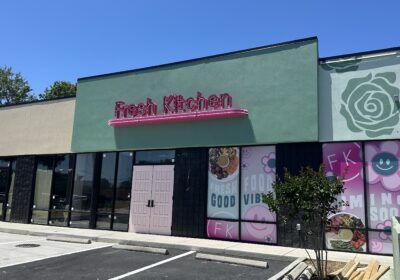BOG approves Andros Village housing complex

Andros Village will include housing, retail, dining and athletic facilities upon its full completion for the 2019 school year. Special to the Oracle
USF’s fledgling housing project has finally matured and will soon come to fruition.
After nearly two years, the public-private partnership (P3) between USF and Harrison Street Investor Corporate Member and Capstone Development Partners, LLC (HSRE-Capstone) went before the Board of Governors (BOG) on Thursday.
The proposal was approved, and “construction (on the first phase of the Andros Village) will commence in May 2016 with completion scheduled for Fall 2017,” according to the project summary presented before the BOG Facilities Committee on Wednesday.
According to the terms of the partnership, USF will not be financially responsible for the construction, operation and custodial maintenance of the project. Rather, HSRE-Capstone will shoulder the financial burden and collect revenue from rent paid by residents.
Also according to the project summary, USF chose to pursue a P3 because it would allow for "accelerated deliver; … reduced credit rating exposure; and … transfer of risk to (HSRE-Capstone) for construction, operation, and demand."
“The university is not exposed to any financial aspect of this, and — at least as it’s currently constructed — we will assume responsibility for assignments and for marketing,” said Tom Miller, vice president of Student Affairs. “This new facility will be — from the student experience perspective — kind of seamless in our housing stock.”
In its original proposal, USF would enter into a “51-year Ground Sub-Lease with HSRE-Capstone Tampa … to construct, finance, and maintain the Project.” But Miller said some members of the board were hesitant to agree to such a long-term agreement. However, USF was more than willing to cooperate.
“If it has the effect of getting board approval, it’s not a hard change to make,” he said.
Another major change that resulted from the board’s review and recommendations for the project is an end to the on-campus residence requirement for first-year students.
Currently, USF requires first-year students to live on campus, unless they intend to live nearby with a relative.
“The significance of (removing) the on-campus living requirement is that there are people on the board, and others in Tallahassee, that saw that as something that increased the cost of attendance, because it made the room rent non-optional for that population,” Miller said.
In addition to the lease agreement, USF and HSRE-Capstone will enter into a "Management Agreement that overlaps the term of the (lease)," which will allow USF to recieve $1,300 per bed in reimbursement for operational costs, as well as $4.08 per gross square foot in custodial maintenance reimbursement.
In a conference call Thursday, USF President Judy Genshaft said the holistic nature of the Village — which will include space for housing, dining, retail and athletic facilities — will be incredibly beneficial to current and future students.
“It is absolutely a transformational opportunity for the students,” she said. “There is data across the nation that says students (who) live on campus and reside and have a life experience on campus do better, finish school sooner and are happier graduates.”
She said while construction of the project takes place, students who would have lived on campus will be housed in the university’s affiliated apartments.
For the 2015-16 school year, the average on-campus rent is $574.86 per month, based on the combined monthly rent of every type of housing available, divided by the total number of such options. Meanwhile, the average rent at USF-affiliated apartments is $727.82 per month. For other nearby apartment complexes, the average is much lower, with the lowest monthly rent offered at a nearby complex unaffiliated with the university that primarily houses students: $469.
USF Board of Trustees member Brian Lamb emphasized the project will strive to keep the cost of on-campus living “comparable” to current housing.
“We were very thoughtful in this process to make sure that we maintained affordability and access to our students,” he said. “With that, when this project is complete, we will have very comparable pricing to existing housing that is on campus.”
USF also maintained similar rates when it opened Juniper-Poplar Hall (JPH) in 2009 — the rate for a double occupancy suite in JPH is the same as a double in Kosove Hall.
Indeed, students living in double occupancy rooms in the new Andros Village will pay approximately $911.25 per month ($3,645 per semester, compared to $2,652.80 in existing housing), which also reflects a projected a 5- to 10-percent increase based on inflations. For perspective, the average rent in other residence halls with a 10 percent increase in two years is $689.62 per month ($3645 per semester, compared to $3183.36 in existing housing), and the off-campus housing affiliates' rent average rises to $873.38 per month with the same consideration.
The new apartments are projected to be finished by 2019, with the west side completed first, in 2017.






